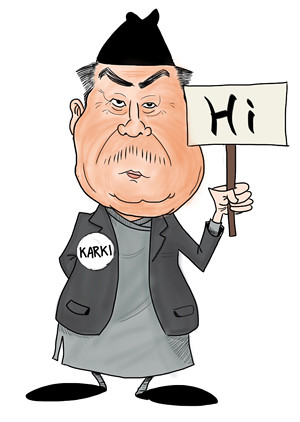Nepal has one of the finest laws to tackle corruption, but in the hands of the wrong person, that law can be lethal

DIWAKAR CHETTRI
It has been the lot of the Nepali polity to suffer interminable dissonance, from deep history to the present. The latest post-conflict era has been marked by events that affect ‘normalisation’, which are mainly driven by prejudiced efforts of one party to push its agenda and the inability of the ‘democratic forces’ to protect the people.
The much-touted peace process has been a period used by the UCPN-Maoist to consolidate its position in open society. Which in itself is a natural course for the former rebel party to take, but for this purpose it has used extreme opportunism which has been destructive for society as a whole.
The party has promoted whatever is good for itself without a view to the need for normalisation so that the economy would grow and the poor would get succor. Starting with the obstacles created for consensus government which forced the Nepali Congress to stay in the opposition in the early days of the Constituent Assembly, in the following years the Maoists blocked the peace process for more than five years, sought to push through a constitution for a one-party state, and got involved in corruption the scale of which can only be imagined.
It was possibly to protect itself through an amenable chief of the Commission for the Investigation of Abuse of Authority that the name of Lok Man Singh Karki was proposed by Pushpa Kamal Dahal. This became yet another roadblock on the road to normalisation because a person was being proposed to head the anti-graft body, when the same institution had indicted him for corruption years earlier.
The anti-graft law that backs the CIAA is an exemplary one, which was possible because of the democratic window that opened with parliamentary practice after 1990. The CIAA chief’s position has been made powerful and Nepal was at the time proud to be the country which had enacted one of the finest laws to tackle corruption.
However, in the hands of the wrong person, that law can be lethal. It can be used to bring down independent politicians, to wring the throat of entrepreneurship and promote crony capitalism and piranha foreign investors rather than genuine ones. This is why Karki seems to have been chosen by the UCPN-M leadership.
An important matter that has not been addressed in the past week’s activism is the impact on domestic and foreign investment when you place someone of such non-credibility on the chair of the anti-graft body with the express intention of cleansing one party and hounding its political opposition. This will drive away anyone wanting to genuinely invest in Nepali society and will lead to capital flight – impacting employment and continuing export of youth labour to the menial Indian and overseas market.
An additional distressing element in the Karki episode has been the widely talked about involvement of some foreign ‘elements’ in propelling him to the post of CIAA chief – which would put the said person in an unassailable position for the next six years to do the bidding of whoever would replace him in that position.
Given the complete abdication of responsibility by the NC and CPN (UML) and even the involvement of the top leadership in agreeing to appoint Karki as the head of the CIAA, it is left to the citizens as well as the party rank and file to rise against this further obstruction to normalisation.